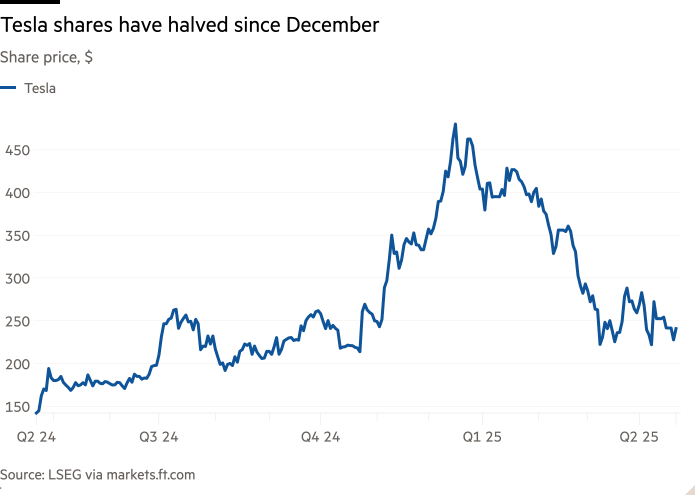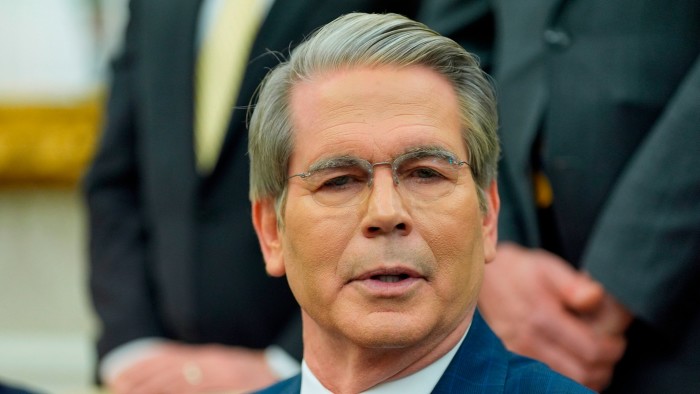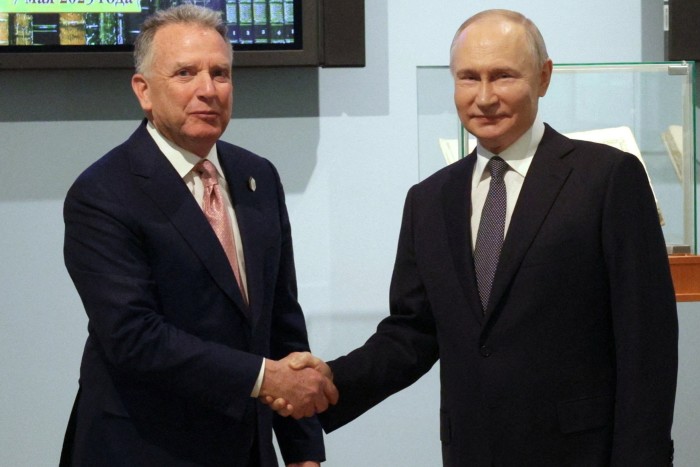Global confidence slumps as trade turmoil looms over IMF meetings
Stay informed with free updates
Simply sign up to the Global Economy myFT Digest — delivered directly to your inbox.
Threats to global growth are rising as the US-driven trade shock crushes confidence and slams financial markets, according to research for the Financial Times ahead of key meetings of economic policymakers in Washington this week.
Confidence indicators have slumped sharply while financial market conditions have deteriorated, according to the Brookings-FT Tracking Indexes for the Global Economic Recovery, or Tiger. The deterioration in the global outlook is a marked contrast to the relatively firm start to the year.
Eswar Prasad, a senior fellow at the Brookings Institution, said it would be “premature” to forecast a worldwide recession but warned that the breakdown of global trade and higher policy uncertainty would markedly suppress growth.
“We have seen this huge shock,” said Prasad. “Every open economy that relies on trade is going to get squeezed, and on top of that you will have [negative] confidence effects.”
The findings come as economic policymakers and finance ministers from around the world gather in Washington for the first set of IMF/World Bank spring meetings since Donald Trump’s inauguration as US president.
Kristalina Georgieva, the managing director of the IMF, on Thursday warned the fund was preparing to cut growth forecasts, as “financial markets volatility is up” and “trade policy uncertainty is literally off the charts”.
In January the fund predicted global growth of 3.3 per cent this year and next, with the US set for an expansion of 2.7 per cent this year and 2.1 per cent in 2026.
Trump’s decision to announce sweeping tariffs on most of America’s trade partners on April 2 set in train sharp declines in financial markets and a swath of downgrades to growth predictions.
The European Central Bank on Thursday trimmed its key interest rate to 2.25 per cent as it prepared for the fallout from the trade wars, warning the outlook for growth had deteriorated because of “rising trade tensions”.
The twice-yearly Brookings-FT Tiger Index compares indicators of real activity, financial markets and confidence with their historical averages, both for advanced economies and emerging ones.
The confidence numbers for the US are particularly stark, showing the lowest confidence levels since the index began, alongside a sharp deterioration in financial market conditions. Confidence levels in China and Germany also hovered at depressed levels.
Indicators of real activity in the US remained relatively strong, according to the report, but these are based on data running up to January 2025 and thus predate the introduction of Trump’s trade policies.
Some signs continue to point to firm activity in the US, with retail sales jumping 1.4 per cent in March, although this may have been driven partly by a surge in auto sales as consumers seek to get ahead of the tariffs.
The financial markets index in the Tiger report drew on more recent data, including equity prices up to mid-April. Business and consumer confidence numbers run to the end of March, with news reports used to extend the figures further into this month.
“The uncertainty has severely dented consumer confidence and is likely to take a toll on business investment and employment growth,” said Prasad.
“The Federal Reserve’s ability to support the economy and forestall financial turmoil will be constrained by the pass-through of tariffs into domestic inflation.”
The IMF’s updated growth forecasts are due on Tuesday. Private sector economists have been trimming growth predictions given high policy uncertainty, weakening sentiment and the hit to wealth from falling markets.
Citigroup analysts now see global growth of 2.1 per cent this year and 2.3 per cent in 2026, according to a note last week, warning the risks to their forecast were “strongly skewed to the downside”.
The meetings in Washington come as policymakers await further clarity over the new administration’s stance towards the Bretton Woods institutions.
The US, the largest shareholder in both the IMF and the World Bank, is yet to appoint a permanent director for either of the organisations’ boards.
Neither the president nor his Treasury secretary Scott Bessent has signalled they want to implement a recommendation in the conservative Project 2025 manifesto, published in 2023 by the Heritage Foundation, to “terminate” the US’s financial contributions to the IMF and the World Bank.
But the administration has launched a review into the US’s role and support for international institutions. Bessent is expected to address the new administration’s policies on the IMF and World Bank in a discussion on Wednesday.
Some Republican lawmakers are seeking a change of approach towards the institutions. French Hill, who chairs the House Committee on Financial Services, has advocated for a “back to basics” approach, where the fund focuses on areas such as macroeconomic surveillance and stays clear of trying to provide finance to mitigate climate change.
Both Georgieva and World Bank president Ajay Banga have met Bessent in recent weeks, according to people close to them.
Additional reporting from Aime Williams in Washington






